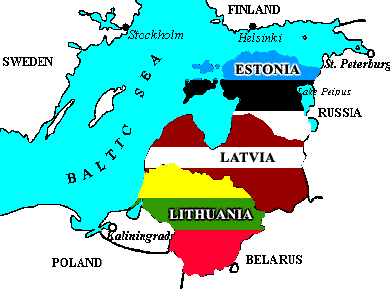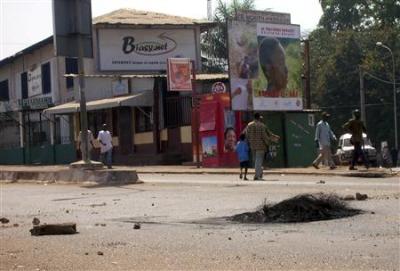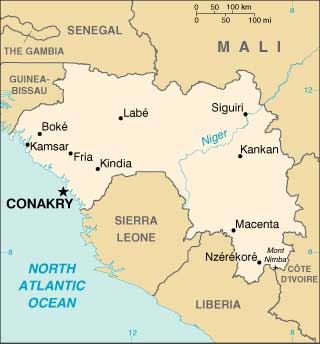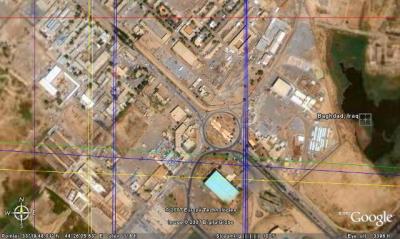Monday, 7. May 2007
Demonstration in support of Estonia
On May 8 at 11:45 am in Vilnius’ Cathedral Square, a massive demonstration will take place in support of Estonia, in response to recent riots in Tallinn and attacks against Estonian diplomats in Moscow by pro-Kremlin youths. The organizers of the demonstration have called on Lithuanian citizens and their Latvian and Estonian counterparts to join this show of Baltic solidarity under the slogan of “We are together! Free and independent!”

The purpose of the demonstration is to not only support Estonia, but to remind European political leardes that silence during times of crisis has often ended in tragedy for the Baltic States.
Every civic-minded citizen, who is concerned about recent incidents in Estonia, as well as other organizations, politicians and journalists, are invited to join this display of solidarity. Those wishing to participate are encouraged to e-mail lt.lv.est@gmail.com.
Plenty of civic organizations already expressed their support and willingness to participate at the event.
Lithuanians, Latvians and Estonians as well will join hands simultaneously at 12:05 in Vilnius, Riga, and Tallinn and on the borders of these states to express the will and the unity of the Baltic States.
This will be reminiscent of the Baltic Way*, when Lithuanians, Latvians and Estonians declared that the Baltic States would stand together during their greatest times of challenge.
As long as gatherings are restricted in Tallinn, people there are encouraged to wave Latvian, Lithuanian and Estonian flags out of their windows in houses, offices, cars, showing their moral support to event.
Riots in Tallinn and assaults on Estonian diplomats in Moscow, both verbal and physical, demonstrate that threats to Baltic security have assumed a different face.
The riots in Tallinn were a serious warning and lesson for the three Baltic States. Aggressive statements by Russian government officials and slanted Russian media reports in support of inadmissible acts of violence and vandalism by marauding youths were not only shocking, but totally unacceptable.
For further information, contact Mr. Justinas Pagirys, tel. +370 675 32108 or Ms. Indrė Makaraitytė, tel. + 370 685 12732

The purpose of the demonstration is to not only support Estonia, but to remind European political leardes that silence during times of crisis has often ended in tragedy for the Baltic States.
Every civic-minded citizen, who is concerned about recent incidents in Estonia, as well as other organizations, politicians and journalists, are invited to join this display of solidarity. Those wishing to participate are encouraged to e-mail lt.lv.est@gmail.com.
Plenty of civic organizations already expressed their support and willingness to participate at the event.
Lithuanians, Latvians and Estonians as well will join hands simultaneously at 12:05 in Vilnius, Riga, and Tallinn and on the borders of these states to express the will and the unity of the Baltic States.
This will be reminiscent of the Baltic Way*, when Lithuanians, Latvians and Estonians declared that the Baltic States would stand together during their greatest times of challenge.
As long as gatherings are restricted in Tallinn, people there are encouraged to wave Latvian, Lithuanian and Estonian flags out of their windows in houses, offices, cars, showing their moral support to event.
Riots in Tallinn and assaults on Estonian diplomats in Moscow, both verbal and physical, demonstrate that threats to Baltic security have assumed a different face.
The riots in Tallinn were a serious warning and lesson for the three Baltic States. Aggressive statements by Russian government officials and slanted Russian media reports in support of inadmissible acts of violence and vandalism by marauding youths were not only shocking, but totally unacceptable.
For further information, contact Mr. Justinas Pagirys, tel. +370 675 32108 or Ms. Indrė Makaraitytė, tel. + 370 685 12732
ieva jusionyte, 11:56h
... link (0 Kommentare) ... comment
Thursday, 15. February 2007
Guinea on the verge of civil war


International Crisis Group
Africa Report N°121
14 February 2007
EXECUTIVE SUMMARY
The 12 February 2007 declaration of siege and establishment of a permanent curfew and martial law by President Lansana Conté after three days of renewed violence has brought Guinea to the verge of disaster. Towns throughout the country rallied to the general strike launched on 10 January, turning it into an unprecedented popular protest against the Conté regime. The repression of the demonstrations – over 100 dead in total since January – and the nomination of Eugène Camara, a close Conté associate – as prime minister have shown the regime will do anything to ensure its survival. The international community, which has been largely quiet and absent, needs to react urgently to help produce real change if chaos that could well spread beyond Guinea’s borders is to be prevented.
Weakened by illness, Conté clings to his privileges, showing more interest in his extensive agricultural estates than the fate of the country. Receiving conflicting advice from sycophants obsessed by presidential succession and safeguarding their own material interests, he has responded to the rebellious trade unions with a mixture of carelessness, clumsiness and violence. His consent on 27 January to delegate powers to a prime minister who would be head of government and the decree he issued four days later setting out the powers of that office do not mean he will actually withdraw and that the system of rule Guineans have rejected will end soon. Nor do they remove the question of responsibility for the January and February slaughter of unarmed demonstrators.
The choice of Camara on 9 February was a tragic mistake that was received in the country as a provocation. It was promptly followed first by riots, and then by renewed violent repression. Red-berets of the presidential guard and anti-riot police fired live rounds at people but prevented neither looting nor the systematic destruction of state symbols, including property belonging to members of the government, the presidential entourage and others associated with Conté’s regime.
Guinea now faces two possible scenarios. There is still a chance, though a diminishing one, for a negotiated solution involving key Guinean, regional and wider international actors. Alternatively, if the Conté regime continues to rely on military repression, it could rapidly bring Guinea to a dramatic spiral of violence: full popular insurgency, with increasing chaos that is likely to stimulate a bloody, military take-over, leading in turn to a possible civil war comparable to those that have torn apart its neighbours in the past decade with uncontrollable consequences.
If it comes to that, the troubles are unlikely to stop at the city limits of Conakry or even the country’s frontiers. Chaos in Guinea’s Forest Region, bordering Liberia, Sierra Leone and Cote d'Ivoire, could well destabilise one or more of those frail countries. Likewise, politically unstable Guinea-Bissau could suffer if its president, Joao Bernardo Vieira, seeks to support his long-time friend, Conté.
Western governments as well as multinational firms that benefit from the country’s natural resources value political quiet but they would be making a serious mistake if this led them to support, even by passivity, an effort to retain the Conté system (with or without its creator). Guinean actors and the international community urgently need to cooperate to implement an action plan that brings about change and prevents an escalation of violence.
More: http://www.crisisgroup.org/home/index.cfm?id=4661&l=1
(Photo: REUTERS/Saliou Samb)
ieva jusionyte, 14:30h
... link (2 Kommentare) ... comment
Tuesday, 13. February 2007
How to survive in Baghdad?

In order to survive sectarian violence in Baghdad, people are using the latest technology - internet to view Google Earth images of the area, satellite television and mobile phones to share them. This helps in knowing which routes are safe to take, if one wants to avoid getting killed or kidnapped, and how to escape from dangerous neighborhoods. This early morning from my small room in Boston I was able to fly over the was-ridden city to see for myself the busy streets from deadly quiet areas.
A full article from BBC News:
http://news.bbc.co.uk/2/hi/middle_east/6357129.stm
But who can explain me how they benefit from using a year or two old satellite pictures for everyday coordination?
ieva jusionyte, 09:00h
... link (0 Kommentare) ... comment
Wednesday, 31. January 2007
Genocide resolution in Congress
Democratic and Republican lawmakers introduced a resolution urging the U.S. government to recognize as genocide the deaths of 1.5 million Armenians at the end of World War I, Assotiated Press reported Tuesday evening.
ieva jusionyte, 01:07h
... link (0 Kommentare) ... comment
Tuesday, 30. January 2007
Barbaro is gone

(photo by R. Donnell, NY Times)
The champion horse - Barbaro, winner of the Kentucky Derby, - was euthanized yesterday after eight months of trying to heal his shattered bones.
Despite my deep love and respect for horses peoples' reaction to the death of their hero is still stunning... maybe even exagerated... but very interesting.
Here are readers' comments from "The New York Times":
http://news.blogs.nytimes.com/2007/01/29/barbaro-is-euthanized-after-struggle-with-injury/
For example one reader writes:
"Barbaro’s death deeply saddened me and my thoughts and prayers go out to his owners, the surgeon and medical staff who cared for him. Barbaro was a true champion in every sense of the word. He blessed us with his beauty and dignity and grace His spirit and will to live were truly inspirational.I held out hope that there would be a miracle and he would survive, despite the overwhelming odds against him. Animals teach us so much about life, love, compassion, kindness and responsibility. We are all interconnected in the web of life. May Barbaro rest in peace and may he continue to inspire us all."
"VALIANT, BEAUTIFUL BARBARO–YOU ARE AN
INSPIRATION! YOUR FIGHT TO BE FREE OF PAIN WAS LONG AND HARD–MAY YOU REST IN PEACE. ENCOURAGEMENT AND SUPPORT FOR THOSE WHO LOVED AND CARED FOR YOU!!"
And another:
"It’s always sad to have a great spirit extinguished but I think they tried everything they could. I just hope he had a chance to go outside and enjoy his last day with the sky and the grass."
The other comments are rather different:
"This is a horse. Just because he was a special horse that won a race, is no reason to expend this much emotional energy. We shoot horses every day and do worse to other animals. Barbaro had bad luck. Children in this world, people in Darfu, people in Baghdad are treated much worse with less care than we are giving a horse."
"an all too common tragedy…barbaro is simply the public face for many horses who needlessly suffer for human’s greed."
Euthanasia is forbidden among people, but not among horses. Maybe it is time to rethink it.
ieva jusionyte, 10:00h
... link (0 Kommentare) ... comment
Sunday, 31. December 2006
2006-2007
The last news of 2006 and the first news of 2007:
"The New York Times" remembers the faces of 3000 individuals who have died in Iraq, the first death - that of Jay Aubin from marine corps - dating back to March 21, 2003, and the last one - that of the twenty-year old William Spencer - December 28, 2006. A must-see interactive square: http://www.nytimes.com/ref/us/20061228_3000FACES_TAB1.html.
It was still December 31 when Belarus and Russia reached a deal on gas - a sign that Belarussians will not have to suffer from cold like the Ukrainians did last year. Minsk will have to pay 100 dollars per 1000 cubic metres of gas, which is 5 dollars below the price demanded by Russia that was threatening to halt supplies on Monday, January 1. Until now Belarus used to pay 47 dollars for the same amount of gas to "Gazprom", according to which the change reflects market prices and has no political agenda.
From now on the European Union has twenty-seven members and half a million citizens as two more states from Eastern Europe - Romania and Bulgaria - joined the club at midnight on New Year's Day. More: http://euobserver.com/9/23154.
The on-line news portal where I used to work changed from Omni.lt to http://www.balsas.lt/. Balsas (Lithuanian) = the voice.
"The New York Times" remembers the faces of 3000 individuals who have died in Iraq, the first death - that of Jay Aubin from marine corps - dating back to March 21, 2003, and the last one - that of the twenty-year old William Spencer - December 28, 2006. A must-see interactive square: http://www.nytimes.com/ref/us/20061228_3000FACES_TAB1.html.
It was still December 31 when Belarus and Russia reached a deal on gas - a sign that Belarussians will not have to suffer from cold like the Ukrainians did last year. Minsk will have to pay 100 dollars per 1000 cubic metres of gas, which is 5 dollars below the price demanded by Russia that was threatening to halt supplies on Monday, January 1. Until now Belarus used to pay 47 dollars for the same amount of gas to "Gazprom", according to which the change reflects market prices and has no political agenda.
From now on the European Union has twenty-seven members and half a million citizens as two more states from Eastern Europe - Romania and Bulgaria - joined the club at midnight on New Year's Day. More: http://euobserver.com/9/23154.
The on-line news portal where I used to work changed from Omni.lt to http://www.balsas.lt/. Balsas (Lithuanian) = the voice.
ieva jusionyte, 20:29h
... link (0 Kommentare) ... comment
Saturday, 30. December 2006
Hussein hanged
The New York Times report that Saddam Hussein was hanged just before dawn (3 am GMT) during the morning call to prayer on Saturday, Baghdad time. The execution happened before the appeal that Hussein made was decided on and just before the Muslim celebration of Eid, which might have postponed the execution, start. His half-brother Barzan al-Tikriti and former Iraqi chief judge Awad Hamed al-Bandar are also reported to have been executed, BBC say. All three were sentenced to death by an Iraqi court on 5 November after a year-long trial over the 1982 killings of 148 Shias in the town of Dujail.
ieva jusionyte, 01:23h
... link (3 Kommentare) ... comment
Friday, 29. December 2006
Belarus
Slovakian NGO "Pontis Foundation", working with democracy-building issues, released their brief on Belarus, entitled "How the West continues to loose Belarus". They claim that while Alexander Lukashenka appears to be desperately seeking new allies abroad, the repressive course of domestic policy has continued or even further increased. However, the main question now is the gas dispute between Minsk and Moscow. Is it a mere rhetorical exercise, which supports Russia's argument against double-standard energy policy within the CIS, and forces the West to accept Lukashenka? Importantly though, the newly added export duty on crude oil exports to Belarus indicates that (part of) the pressure from Moscow is real and the main goal is unchanged: to gain the economic assets of Belarus, decrease the space for Lukashenka, but not to destroy the economy. Nevertheless, what the Pontis Foundation finds most important, Belarus is increasingly positioning itself in relation to Russia as an independent state with Lukashenka gradually adopting the previous policy of the Belarusian nationalists from the early 1990s. This patriotic rhetoric and policy, despite a persisting, deep political gap within society, forces the emerging political consensus regarding the country's independence.
This Brief is also available online at:
http://www.nadaciapontis.sk/tmp/asset_cache/link/0000015290/Belarus_Brief-How_the_West_is_loosing_Belarus.pdf
This Brief is also available online at:
http://www.nadaciapontis.sk/tmp/asset_cache/link/0000015290/Belarus_Brief-How_the_West_is_loosing_Belarus.pdf
ieva jusionyte, 11:44h
... link (0 Kommentare) ... comment
Somalia
The Islamists - militiamen that are loyal to the Union of Islamic Courts - were driven out of Somalia's capital Mogadishu. Now the city is ruled by the interim government that receives support from Ethiopia. Ali Mohamad Ghedi, the interim prime minister, declared three months of martial law. The forces of the UIC say they will not abandon Somali that easily. According to BBC, the UN estimates that about 30,000 people have been displaced during the fighting and causalities have been high, hundreds of young people have been killed and some 800 people, mainly on the Islamic side, have been treated in hospital.
ieva jusionyte, 11:36h
... link (1 Kommentar) ... comment